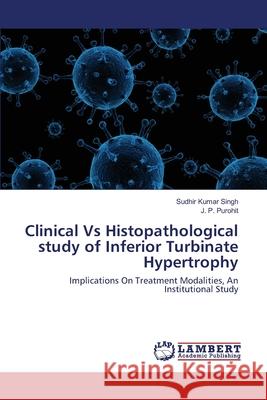Clinical Vs Histopathological study of Inferior Turbinate Hypertrophy » książka
Clinical Vs Histopathological study of Inferior Turbinate Hypertrophy
ISBN-13: 9783659353109 / Angielski / Miękka / 2013 / 104 str.
Persistence of nasal inflammation disorders results in the deposition of collagen in the nasal mucosa and subsequent glandular hyperplasia, which may lead to irreversible mucoperiosteal hypertrophy. The inferior turbinate is inferior in folding of the lateral nasal wall .Three layers of turbinates medial thin mucosa, bone, lateral thick mucosa, mucosa of inferior turbinate contains peudostratified columner ciliated respiratory epithelium, goblet cells produces, salts, glycoproteins, polysaccharides and lysozymes and complex array of arteries, veins and venous sinusoid under cover of lamina propria. There is long controversy among those who perform inferior turbinectomy over where and how much to excise during surgery. The decision should be based not only on the clinical presentation but also on the histopathological feature of the organ.This present study was undertaken to provide information on various constituents of the hypertrophic inferior turbinate and to compare the histopathological changes in chronic inferior turbinate hypertrophy versus clinical presentation of allergic and non allergic origin.
Persistence of nasal inflammation disorders results in the deposition of collagen in the nasal mucosa and subsequent glandular hyperplasia, which may lead to irreversible mucoperiosteal hypertrophy. The inferior turbinate is inferior in folding of the lateral nasal wall .Three layers of turbinates medial thin mucosa, bone, lateral thick mucosa, mucosa of inferior turbinate contains peudostratified columner ciliated respiratory epithelium, goblet cells produces, salts, glycoproteins, polysaccharides and lysozymes and complex array of arteries, veins and venous sinusoid under cover of lamina propria. There is long controversy among those who perform inferior turbinectomy over where and how much to excise during surgery. The decision should be based not only on the clinical presentation but also on the histopathological feature of the organ.This present study was undertaken to provide information on various constituents of the hypertrophic inferior turbinate and to compare the histopathological changes in chronic inferior turbinate hypertrophy versus clinical presentation of allergic and non allergic origin.











